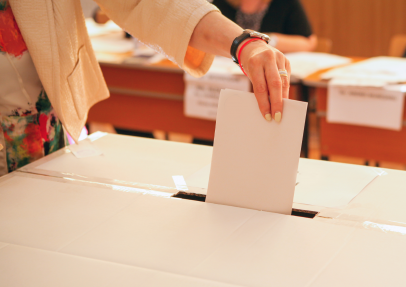
High Cost, Low Price for Elections
Nurhalifah, a resident of Gundih, Surabaya, East Java, seemed to gaze far into the past when asked about her late father, Syaiful Arief, who died while performing his duties as a Polling Station Working Group (KPPS) officer.
She and her father weren't particularly close, but when she learned of Syaiful's death, the lingering regret in her mind was, "If only I had known yesterday that he would be so exhausted, I would have strongly discouraged him."
Syaiful was one of the 894 victims who passed away during or after the simultaneous 2019 elections. Unlike the five years prior, the 2019 simultaneous elections included the presidential election as well as elections for members of the DPR (People's Consultative Assembly), provincial DPRD (Regional People's Representative Council), district/city DPRD, and DPD (Regional Representative Council).
The number of ballot boxes to be handled increased, making preparations even more challenging. One significant issue that caught attention was the absence of a maximum age limit for KPPS officers. Syaiful continued to serve despite being 69 years old.
Nur admitted that her father was active in government activities. She had suggested that her father be replaced by someone younger, but he had refused. Aside from economic factors, Syaiful felt a sense of fulfillment from being actively involved despite being in his retirement years.
As a result, after the elections were conducted, Syaiful ended up exhausted and passed away a few days later.
Steady Rundengan, a Civil Servant at the Secretariat of the South Minahasa KPU (General Election Commission), in her article titled "The Challenges of the 2024 Simultaneous Elections and Regulatory Reconstruction," noted that the workload of KPPS officers needed to be reevaluated. With the abundance of ballots, KPPS officers had to distribute notification letters to voters, set up Polling Stations (TPS), and conduct voting and vote counting with a large number of ballots.
"They worked tirelessly from three days before until late at night, sometimes even into the morning," Steidy recorded. "This made them exhausted, and some were unable to complete Formulir C1 (the vote recapitulation form) or made mistakes in filling it out. Even worse, some fell ill and even died."
This exhaustion could potentially worsen due to the vote counting recapitulation process after the elections. Not to mention the numerous regulations and voting procedures that had to be adhered to and communicated to the public.
For this reason, Titi Anggraini, a Member of the Board of Trustees of the Association for Elections and Democracy (Perludem), emphasized the need for comprehensive training and socialization for all election organizers, including KPPS officers. Titi's concerns and suggestions were justified, as the families of KPPS victims had previously stated that not many young people or KPPS officers fully understood the socialization and technical aspects of voting.
"That's why the KPU should provide more time for election preparation education. It needs to be clear so that the election day won't be too exhausting," Titi told Tirto.
Cutting Costs?
The simultaneous elections, which claimed many lives, were claimed to save costs since 2014. In reality, the 2019 Elections had to draw over Rp25 trillion from the State Budget (APBN), a figure that couldn't be considered frugal by any means.
The Supreme Audit Agency (BPK) noted a budget overspending of Rp179 billion. Some of the issues were as follows:
• 39 issues of extravagance amounting to Rp163.94 billion, 5.04 thousand Australian Dollars, 6.60 million South Korean Won, and 439.03 thousand Malaysian Ringgit; 12 issues of inefficiency amounting to Rp1.51 billion; 267 issues of ineffectiveness amounting to Rp230.65 million.
• Issues of non-compliance with regulations, consisting of 55 issues of losses totalling Rp7.57 billion; 16 issues of reduced income totalling Rp203.97 million; and 77 administrative issues. When totalled, the amount was approximately Rp179 billion.
However, considering the annual inflation rate in 2014, the increase amounted to only 57.06%, or Rp0.97 trillion, since the nominal budget for support activities amounted to Rp3.29 trillion at present, equivalent to Rp2.67 trillion in 2014, with an inflation rate of 8.36%.
Director-General of Budget at the Ministry of Finance, Askolani, admitted that there was an increase in the budget for this year's elections compared to previous ones. He pointed out at least two factors influencing this budget increase.
The first factor was the regional expansion, which led to an increase in the number of election organizers in various regions, from the District Election Committee (PPK) to the Polling Station Working Group (KPPS).
"The number of Provincial KPU offices increased from 33 to 34. Furthermore, for district-level KPU offices, the number increased from 497 to 514," explained Askolani, as reported on the Ministry of Finance's website.
Despite the claims of overspending, the 2024 simultaneous elections will proceed. Once again, Indonesia will test the effectiveness of simultaneous elections that have already claimed hundreds of lives, labelling them as "democracy heroes" in certificates.
The initial estimated cost was said to exceed Rp110 trillion. However, in the latest announcement, the cost has been reduced to Rp76.6 trillion. This cost is still higher than in previous elections. Although the KPU has now limited the maximum age for KPPS officers to 50, the risk of loss of life is predicted to persist.
The KPU itself cannot guarantee that similar incidents will not occur again. What is clear is that the simultaneous elections, which have already claimed many lives and were claimed to be cost-effective, have turned out to be costly.
"We have to prove that today is better. For example, in regulating campaign fund reporting," said KPU Commissioner Idham Kholik to Tirto. "In terms of strategic and innovative policies, for instance, limiting the age of ad hoc body members, including KPPS, to 50 years."
Idham explained that among the various changes made by the KPU for the 2024 simultaneous elections, the most important was the protection of the lives of KPPS officers and the improvement of their welfare.
Previously, KPPS officers and their staff were expected to receive only Rp700,000. However, now they are estimated to receive between Rp1.1 million and Rp2.5 million. Although this has improved their welfare, it has also resulted in costly elections with potential risks to lives. Nevertheless, Idham remains confident that this election will not become a "bloody election."
"In the past, why did organizers die? It was due to comorbid factors (underlying illnesses) and fatigue. That's why we encourage those with reliable immunity to take on the workload," he added.
By Felix




